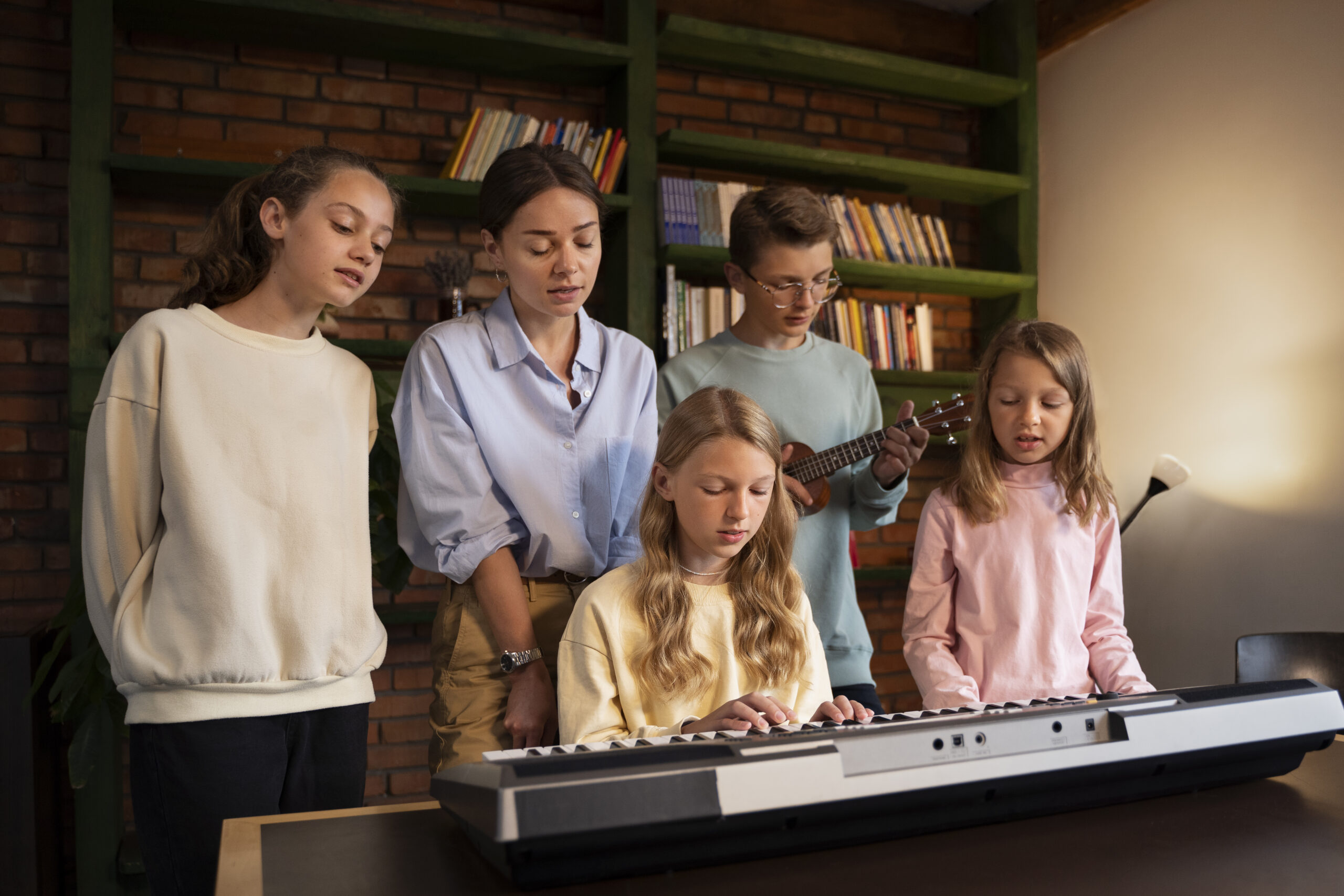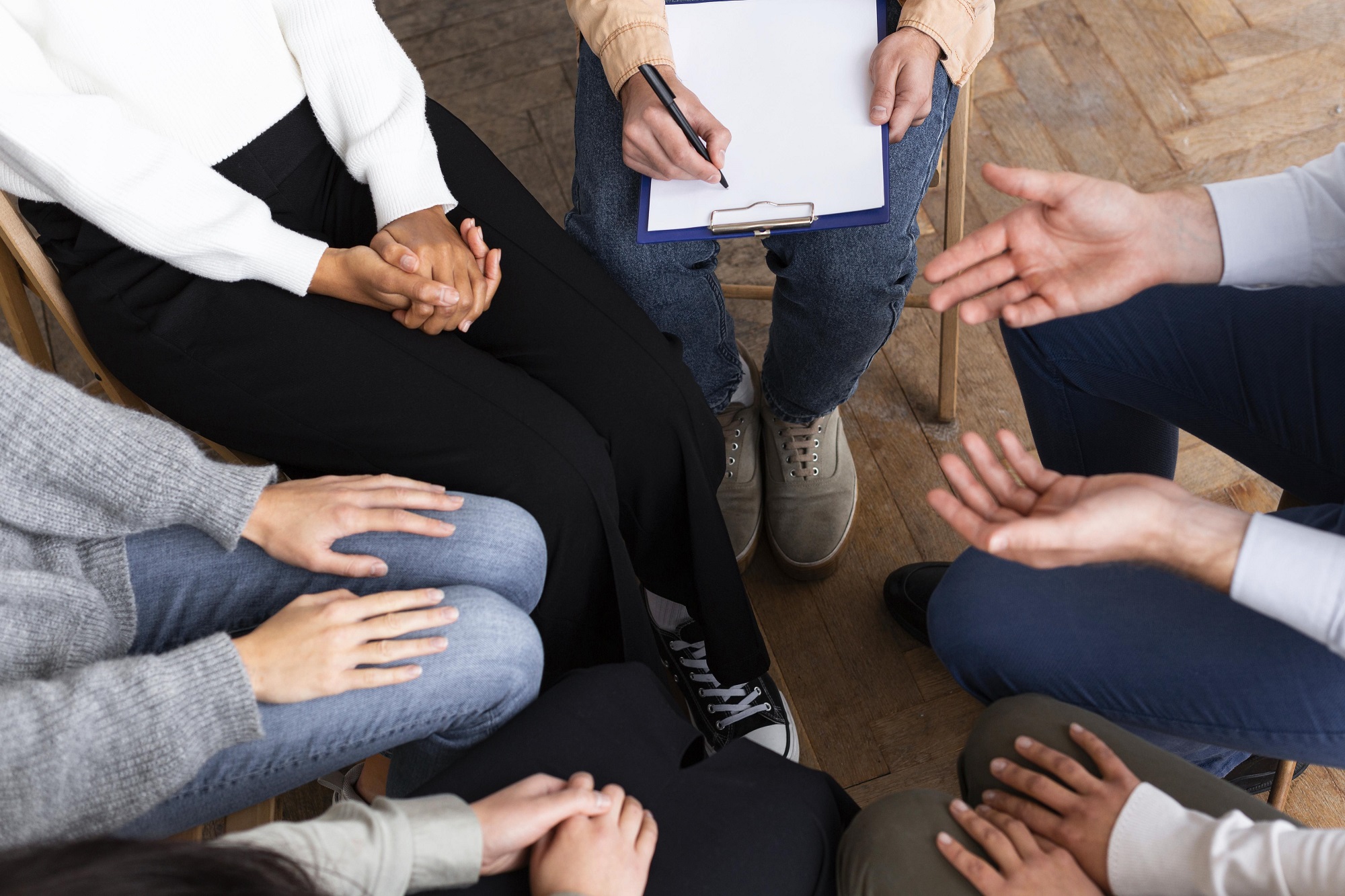by immusic | Nov 28, 2022
Category
vocal
rhythmic
instrumental
Age
12+
Number of participants
5-20
Duration
approx. 20 min.
Working method
group work
Musical abilities of the trainers
12 3 4 5 6
EQUIPMENT
AND INSTRUMENTS
- optional: any type
of instrument
Competences
- improvisation
- creativity
- collaboration
- attention
- cooperation
- concentration
- sense of rhythm
Bead String
Short funny game to develop musical creativity and memory.
AIM
The goal of the game is to develop musical creativity, to promote thinking that always presents new and variation possibilities during the game. Musical memory improvement affects learning abilities in all other areas as well.
Description
The participants stand or sit in a circle. The facilitator provides instructions on the game and which set of sounds can be used during the play.
First participant sings or play a sound.
After that the next participant repeats the sound and adds one.
The next repeats the 2 sounds and adds another sound.
And it goes round the circle.
The goal is to make the longest line of sounds, longest “string of bead.”
Level up!
If the group’s level of knowledge and experience allows it, the game can also run to the point where a common piece can be created.
COMMENTS FOR FACILITATORS
During the activities be care of the steady beat.
by immusic | Nov 28, 2022
Category
rhythmic
Age
8+
Number of participants
5-30
Duration
approx. 10 min.
Working method
group work
Musical abilities of the trainers
1 2 3 4 5 6
Equipment and instruments
- optional: any type of instrument
Competences
- movement coordination
- attention
- cooperation
- concentration
- sense of rhythm
Coordination Game
A very simple, yet tricky movement coordination game in which keeping rhythm is important.
AIM
The game develops movement coordination with a very simple tool, but at the same time it also focuses on keeping the rhythm, and also improving concentration.
Description
The participants stand up, alternately clapping and stamping during the game.
First we start with ten claps – then ten stamps (with alternating legs).
This is followed by 9 claps – 9 stamps…, etc. up to 1 clap – 1 stamp.
Here, however, the game does not end, but turns back!
Then one more clap-stamp up to 10 movements again.
by immusic | Nov 28, 2022
Category
rhythmic
Age
10+
Number of participants
5-30
Duration
approx. 10 min.
Working method
group work
Musical abilities of the trainers
12 3 4 5 6
EQUIPMENT
AND INSTRUMENTS
- optional: any type
of instrument
Competences
- creativity
- improvisation
- attention
- cooperation
- concentration
- rhythm recognition
- sense of rhythm
Check My Beat
A simple game that encourages concentration, keeping the pace, and is based on creativity.
AIM
The goal of the game is to create mutual attention, to promote teamwork and cooperation, while also developing a sense of rhythm and rhythm recognition. Figuring out rhythm formulas develops creativity, and imitation strengthens musical memory.
Description
1. Participants are standing in a circle.
2. The instructor says in a rhythmic way: Here is my rhythm now, check my beat! and claps the steady beat four times.
3. The participants answer together in a rhythmic way, too: We got your rhythm now, here is your beat! and they clap the same.
4. The next person clockwise will be the next one who finds out a new formula and the others will repeat it together and so on.
The formula always contains four quarters, but it can be performed in many ways, e.g. with clicking, with tapping a body part, with la-la. Alternatively, these activities can be mixed.
by immusic | Nov 28, 2022
category
rhythmic
Age
8+
Number of participants
5-30
Duration
approx. 10 min.
Working method
group work
Musical abilities of the trainers
1 2 3 4 5 6
Equipment and instruments
- optional: any type of instrument
Competences
- movement coordination
- attention
- cooperation
- concentration
- rhythm recognition
- sense of rhythm
Rhythm Machine
A rhythm game with which a more complex sound can be achieved.
AIM
This game for developing the sense of rhythm requires a more complex way of thinking by combining simple elements. It depends on the creativity of the participants to achieve a complex sound by layering the rhythms.
Description
This activity is similar to the game called Give me rhythms.
Participants are sitting in a circle. One person starts the Rhythm Machine by doing a simple rhythm that repeats over and over.
This pattern can be a basic 4/4 quarter note beat.
The person sitting to the left of the starter then adds his/her own rhythm to go along with the rhythms that are already going.
Again, the rhythm has to be repeated and cannot be changed.
After everyone has added a rhythm, the first person stops doing his/her rhythm. The others continue their rhythm, the next round the second person drops out, and so on. It continues until the last person has a rhythm.
Rhythm examples:
Comment for facilitators
Percussion instruments can be used during the games, e.g. drums, percussion eggs, wood maracas, rhythm sticks, bells or castanets.
During the activities be care of the steady beat!
by immusic | Nov 28, 2022
Category
rhythmic
vocal
Age
8+
Number of participants
2+
Duration
approx. 20 min.
Working method
- playing in pairs
- group work
Musical abilities of the trainers
1 2 3 4 5 6
Equipment and instruments
- music player / app
to play the video
Competences
- common singing
- attention
- movement coordination
- cooperation
- sense of rhythm
Sing and Fun
A simple and fun game to cheer up the mood of the group
and to relax while doing something more serious.
AIM
The goal of the game is to teach singing in a fun way, using repetition as a learning method. And the clapping associated with the song develops movement coordination and a sense of rhythm.
Description
Learn together the Sarasponda children’s song with clapping until you sing it as fast as you can!
Learning the song can be done in two ways, the facilitator learns the melody in advance and teaches it to the participants, or they practice singing and clapping together with the recording. By learning together with the tutorial video, the ability to observe
and imitate is also developed.
If you already know it very well, you can come up with movements or body percussion exercises yourself.
LYRICS
Sarasponda, sarasponda, sarasponda ret set set.
A doh ray oh, a doh ray boom day oh,
A doh ray boom day ret set set, ah say pah say oh.








Recent Comments